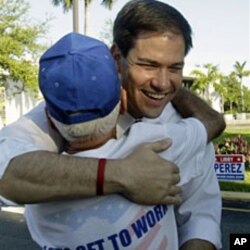In the United States, election activity is intensifying in the final days of the midterm congressional election campaign. Both major political parties are reaching out to key voting groups as the November 2 balloting draws near, hoping to motivate core constituencies to go to the polls on Election Day.
Public opinion polls give opposition Republicans a big advantage heading in the midterm election. For months now, surveys have shown that Republican voters, especially conservatives, are energized about this year's election and intend to turn out in droves.
With that in mind, President Barack Obama and other top Democrats are engaged in a furious last-minute effort to motivate the same key Democratic voting blocs that played such an important role in Mr. Obama's presidential election victory two years ago.
"Just like you did in 2008, you can defy the conventional wisdom. Yes you can! Yes you can!" The president said.
The latest polls suggest a number of Senate races are tightening in the final days of the campaign, offering some encouragement to Democrats. Most analysts expect large Republican gains in the House of Representatives, and many are already predicting that Republicans will gain the additional 39 seats they need to retake control of the House.
Republicans need to gain ten seats to win back a majority in the Senate, but most analysts believe that will be tougher to achieve than winning a majority in the House.
Both major political parties rely on strong support from core constituency groups that tend to be loyal to one party or the other from one election cycle to the next.
Mike O'Brien covers politics for The Hill newspaper in Washington. He says Democrats are focused on getting the same key voter groups who played a role in Mr. Obama's victory two years go to turn out in November as well.
"Those would be young voters, first time voters, who turned out in 2008. Women voters, people from minority communities and that sort of thing. Those voters really turned out in a large capacity in 2008. It was unprecedented," said O'Brian.
Women voters are of particular importance to Democrats in this election. They make up a majority of the population and historically favor Democratic candidates. But this year is different, says Andy Barr with the web site Politico.
"Moderate women are very much up for grabs," said Barr. "They voted heavily for Barack Obama in the last cycle and that turned out in the Democrats' favor. Now polls are showing that they are trending towards Republicans, and so Democrats are doing everything they can to try to appeal to moderate women."
Republicans are counting on a strong turnout from white voters, men and older voters to carry them to victory on November 2.
Those groups have been especially drawn to the Tea Party movement this year, a loosely-organized coalition of grass roots conservative and libertarian groups committed to smaller government and lower taxes.
Marco Rubio is the Republican candidate running for a U.S. Senate seat in Florida. He is also a favorite of Tea Party activists nationally.
"We are on the verge of being the first generation of Americans to leave the next generation of Americans worse off," said Rubio.
Andy Barr of Politico says white males and elderly voters are among the most energized voting blocs this year, and they appear poised to support Republican candidates in large numbers around the country.
"Before, a significant amount went to Barack Obama. But we are seeing extremely high numbers among white males and the elderly voting for Republicans," he said.
Most analysts believe that the number one factor in this year's election is the public's negative view of the U.S. economy, and the high unemployment rate.
John Fortier is an expert with the American Enterprise Institute and a guest on VOA's Encounter program.
"Well I think much of the election is already set. We have a mood in America that has already turned against Democrats and is likely to put a lot of Republicans into office," he said. "The economy is quite bad and midterm elections tend to go against the party in power and the party in the White House."
In addition to the congressional races this year, 37 of the 50 states are holding elections for state governor.














